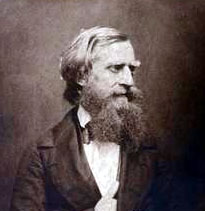Charles Anderson (politician)
Charles Anderson (born June 1, 1814 in Louisville , Kentucky , † September 2, 1895 in Kuttawa , Kentucky) was an American politician ( Republican Party ) and from 1865 to 1866 the 27th governor of the state of Ohio .
Early years
Anderson attended Miami University in Oxford until 1833 . After studying law, he embarked on a legal career in Dayton . He worked as a lawyer and for a year as a district attorney.
Political rise
In 1844, Anderson was elected to the Ohio Senate. There he stood up for the rights of African American people . He then traveled to Europe and then returned to his legal practice. Since 1848 he lived in Cincinnati . There he ran a group practice with Rufus King. Around 1855 he returned to Dayton for a short time before moving to Texas for health reasons , where he had bought a farm. There he got into the political discussion about the secession of the southern states in 1860 . In December 1860, in view of the withdrawal of South Carolina from the Union, Anderson gave a fiery speech in San Antonio against secession and for the preservation of the Union. This made his position in Texas, which was on the south side, untenable. He was insulted, arrested for no reason, and persecuted. So he fled north again via Mexico and returned to Dayton.
When the civil war broke out , President Abraham Lincoln sent him on a mission to Europe to promote the cause of the northern states . Upon his return he became a colonel in an infantry unit. He participated in several battles and was badly wounded. After the end of his military service, Anderson turned back to politics. In 1863 he was elected lieutenant governor of Ohio.
Governor of ohio
When incumbent Governor John Brough died on August 29, 1865, Anderson had to end the remaining term of office. This was relatively short and ended on January 8, 1866. The few months that Anderson served as governor were largely uneventful in Ohio. Essentially, the consequences of the civil war had to be overcome.
After the end of his tenure, Anderson withdrew from politics. He was initially a lawyer in Dayton and later moved back to Kentucky. There he founded the village of Kuttawa in Lyon County , where he died in 1895. Charles Anderson was married to Eliza J. Brown, with whom he had three children. He was a brother of Major Robert Anderson , who, as commanding officer of Fort Sumter , became involved in the first fighting of the Civil War in April 1861 and finally had to surrender.
Web links
- Charles Anderson in the National Governors Association (English)
- Charles Anderson in the Ohio History Connection Archives
- Charles Anderson in the database of Find a Grave (English)
| personal data | |
|---|---|
| SURNAME | Anderson, Charles |
| BRIEF DESCRIPTION | American politician |
| DATE OF BIRTH | June 1, 1814 |
| PLACE OF BIRTH | near Louisville , Kentucky |
| DATE OF DEATH | September 2, 1895 |
| Place of death | Kuttawa , Kentucky |

